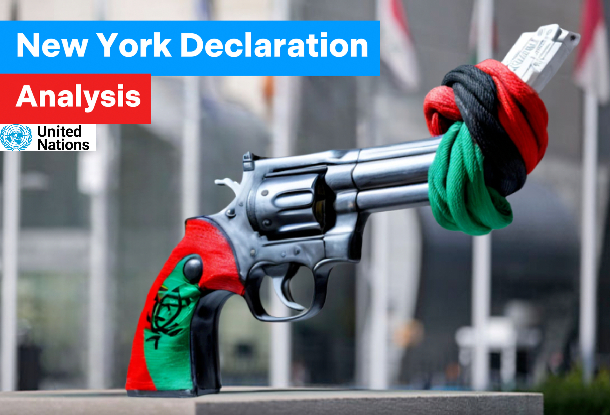On Tuesday, a conference was held at the United Nations headquarters in New York, where Arab nations such as Saudi Arabia, Jordan, Egypt, Qatar, and Turkey convened, led by France and Saudi Arabia, to seek solutions for a peaceful resolution to the Palestine issue and to advance the two-state solution. The outcome of this conference was encapsulated in a document referred to by the media as “The New York Declaration,” which adds to the extensive list of efforts aimed at rejuvenating the discussion surrounding the two-state solution between Israel and the Palestinians. Unsurprisingly, the United States and Israel were not present; the document received backing from seventeen countries, the 22-member Arab League, and the European Union, outlining a systematic approach to address the nearly eighty-year-long conflict and the ongoing humanitarian crisis in Gaza. Understanding whether the framework outlined in this declaration embodies genuine hope or merely false hope for the Palestinian people is crucial.
The declaration received support from the EU and over twelve countries, urging Israel “to promptly cease violence and incitement against Palestinians, to immediately stop all settlement activities, land grabs, and annexation efforts in the Occupied Palestinian Territory, including East Jerusalem, to publicly reject any plans for annexation or settlement policies, and to put an end to the violence perpetrated by settlers, which includes the implementation of UNSC resolution 904 and the establishment of legislation aimed at punishing and deterring violent settlers and their unlawful actions.”
DOCUMENT: New York Declaration on the Peaceful Settlement of the Question of Palestine and the Implementation of the Two-State Solution signed at the United Nations High-Level International Conference in New York on Tuesday, 29, 2025.
NV_High-Level-Conference-Outcome-document
We acknowledge that, for some reason, Article 9 of the document is absent; nevertheless, the declaration made at the UN has already been disseminated by various media outlets, which allow the review of section 9 as it was presented during the conference. (Source: Jewish Virtual Library)
9. We demanded the immediate, safe, unconditional and unhindered delivery of humanitarian assistance at scale through all crossings and throughout the Gaza Strip, in coordination with the UN and ICRC and in line with humanitarian principles. This must include the immediate lifting of restrictions and opening by Israel, the Occupying power, of border crossings, resumption of power supplies and the entry of fuel, medical supplies, food, water and other essential supplies. We reiterated that the UN and humanitarian workers must be protected and able to operate effectively. We stressed our rejection of any use of starvation as a method of warfare which is prohibited under international law and the importance of immediate action to address rapidly rising cases of starvation and to prevent widespread famine in Gaza.
In simple terms, Article 9 asks Israel to lift the illegal siege on Gaza, and to urgently address the famine that the Hebrew state has deliberately created in the Strip, to avoid an irreversible catastrophe.
In Article 39 of the declaration, the signatories propose to create a regional and international structure that provides adequate support for addressing the refugee issue, while reaffirming the right of return. Palestinian refugees’ right of return is enshrined in UN General Assembly resolution 194. The United Nations Relief and Works Agency for Palestine Refugees in the Near East (UNRWA) was established to assist in the implementation of that resolution, which has been reaffirmed by the General Assembly since 1948. This is an important point to consider, as it highlights one of the primary reasons Israel aimed to remove UNRWA from Gaza, by advancing a deceptive home-cooked Israeli “Hasbara” (propaganda), which falsely asserts that UNRWA personnel were involved in the October 7 attack. It is striking that Article 14 of the declaration implies the scrapping of international organisations and UN agencies like UNRWA that are tasked with safeguarding Palestinian rights, including their right of return. Empowering the Palestinian Authorities is one thing; however, it would be valuable to explore how this framework plans to adhere to the Palestinians’ right of return within the framework of a two-state solution, without the guarantees that Israel will agree to any of this. There are numerous ambiguous aspects concerning the execution of the right of return for Palestinian refugees, which necessitate clarity and straightforward language.
Interestingly, the declaration calls for the disarmament of the Palestinian resistance, which remains under occupation, but also requires the surrender of its weapons to the Palestinian Authority. Additionally, the declaration supports the establishment of a “demilitarised” Palestinian state, even as Israel, the occupying force, continues to commit war crimes and crimes against humanity, while being permitted to keep its guns, nuclear deterrence, and maintain its ability to carry out further acts of genocide. Perhaps it is worth remembering that armed resistance (struggle) is protected by UN Resolution 37/43 (1982). When reading the declaration, the notion of justice for decades of apartheid, occupation and war crimes is not truly reflected, something which should have been included in the first Article of this declaration. In contrast, many unjust concessions are being requested from the Palestinians, while numerous loopholes are available for Israel to exploit, seemingly allowing it to evade any repercussions.
The declaration reiterated backing for a two-state solution based on the 1967 lines and in line with international law and UN resolutions, including with regard to Jerusalem (as the capital?)
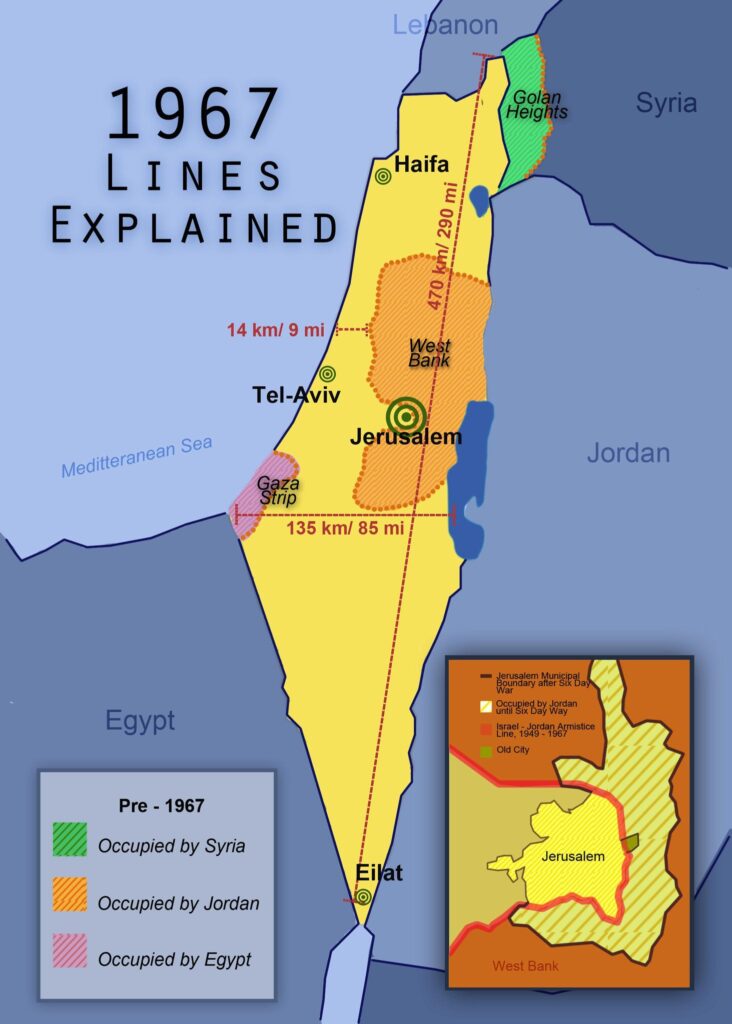
While we can contemplate the lack of the term Genocide and the omission of Article 9 in the “New York Declaration”, there are still reasons to feel optimistic. The negotiation of a two-state solution will no longer rest solely with the United States; instead, it will be a collaborative effort involving other key European players. This represents a notable and historic achievement. Nevertheless, it is essential that International humanitarian organisations and their legal team review the proposed framework for executing the proposals outlined in the document, to assess its viability under International law. Undoubtedly, this is a forward-thinking advancement, and Europe should not be deterred by the United States, but instead, strive to uphold the standards of international law and justice that the global community expects from countries like France, where the “Declaration of the Rights of Man and the Citizen” was enacted in 1789. The United States and Israel will act in ways we can predict, which means more conflict and deception; nevertheless, more countries will continue to rally to the cause, ultimately increasing the pressure on the two main actors responsible for the Gaza genocide.
To understand why France and so many powerful countries are eager to support a demilitarised Palestine, we must revisit the reasons behind these nations’ deafening silence for more than 600 days of genocide, which suggests some form of alignment with Israel’s policies and actions, or some form of coercion. We must also appreciate the fact that the “New York Declaration” carries an unnerving neocolonial vision of Palestinian sovereignty under which colonial stabilisation is being presented as peace…
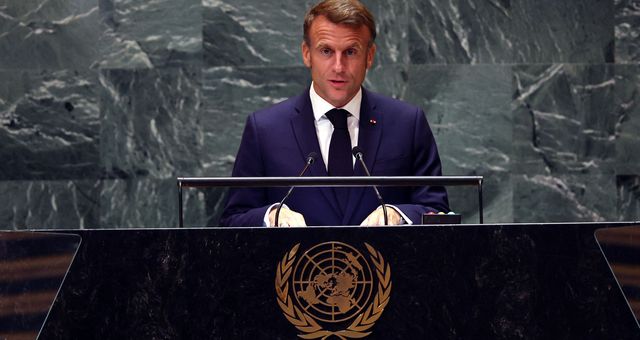
IMAGE: Emmanuel Macron at the United Nations headquarters in New York, September 25, 2024. (Source: ©AFP – SPENCER PLATT / GETTY IMAGES NORTH AMERICA / Getty Images via AFP)
Amine Snoussi reports for Frustration Magazine…
Why does France want to recognise a demilitarised Palestine?
On July 24, 2025, Emmanuel Macron announced France’s recognition of Palestine in September. A weighty symbolic decision, which immediately sparked a backlash from Israeli diplomacy, with Benjamin Netanyahu seeing it as “support for terrorism.” What is the true significance of Emmanuel Macron’s decision, the implications of which appear unfavourable for Palestine?
When it comes to Palestine, French diplomacy is still seeking a balance between the US position and that of the Arab countries. But this does not mean that France is seeking “peace” in the Middle East, as Emmanuel Macron claims in his press release—quite the contrary.
“True to its historic commitment to a just and lasting peace in the Middle East, I have decided that France will recognise the State of Palestine. I will make the solemn announcement at the United Nations General Assembly next September,” wrote French President Emmanuel Macron in a post on X.
Since 1947, the French position on the Palestinian question has oscillated between declarations of principle and imperialist realpolitik. While Paris voted for the partition of Palestine at the UN, it never condemned the Nakba or the mass expulsions of Palestinians in 1948. Worse still, during the Suez Crisis in 1956, France allied itself militarily with Israel against Nasser’s Egypt, a major figure in the Arab anti-colonial struggles. The Gaullist shift of 1967, often cited as evidence of a rebalancing, remains largely symbolic: France criticised Israel’s preemptive war but continued to maintain strategic ties with Tel Aviv. In the following decades, Paris adopted an ambivalent line: recognising the PLO, speaking in favour of a Palestinian state, while concretely refusing to recognise it and rarely condemning the occupation. During the 1990s, France fully embraced the Oslo process, endorsing an asymmetrical peace that confirmed the fragmentation of the Palestinian territory. Throughout the Intifadas and the wars against Gaza, it invoked the “violence of both sides,” pitting settlers against colonised people, while refraining from any concrete measures against the Israeli occupation.
Colonial Solidarity
In recent years, France’s alignment has become more clearly established: under the guise of combating anti-Semitism, it criminalises boycott (BDS) campaigns, bans pro-Palestinian demonstrations, and increasingly aligns itself with Israeli-American positions. In 2024, it went so far as to refuse to support the International Criminal Court when it issued arrest warrants against Israeli leaders. Israeli Prime Minister Benjamin Netanyahu flew over France on February 2 and 9 and April 6 and 8 as part of trips to Washington.
This attitude reflects a constant: France, a former colonial power whose diplomacy was built around this matrix, continues to support, through strategic calculation, the Israeli colonial project.
Behind the diplomatic rhetoric, support for the occupation continues, to the detriment of international law and peoples, going so far as to deliver weapons to the Netanyahu government in the midst of the genocide of the Palestinians. In March 2024, Disclose and Marsactu revealed that France had authorised the export of ammunition links intended for Israel, used in particular to assemble machine gun cartridges, via the company Eurolinks in Marseille. In 2025, three shipments were blocked by CGT (The General Confederation of Labour) port strikers at the port of Marseille-Fos. These shipments included weapon components for Negev 5 machine guns, manufactured by Eurolinks, destined for Israel via Haifa. The strikers refused to load them, denouncing French complicity in the violence in Gaza.
The Demilitarisation Trap
To speak of “demilitarisation” in a context where the oppressor is an ultra-armed nuclear power and the oppressed an occupied people is to neutralise the only lever of deterrence or resistance that this ‘people’ can still deploy. This requirement would only apply to Palestine, never to Israel, thus perpetuating a colonial asymmetry: one has an army, drones, fighter jets; the other should have neither weapons nor self-defense.
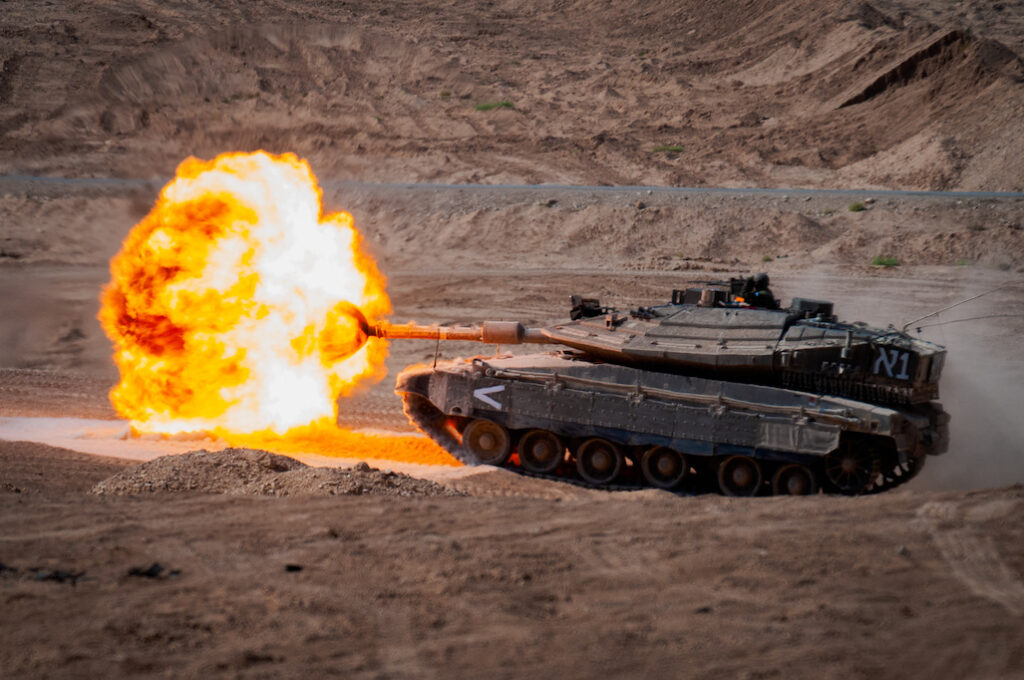
IMAGE: Israeli Merkava Mark 4 tank in 2022 (Source: Nehemia Gershuni-Aylho www.ngphoto.biz, CC BY-SA 3.0 via Wikimedia Commons)
In reality, what France calls a “demilitarised Palestinian state” is a Bantustan: the pseudo-independent territories created by the South African apartheid regime to confine the Black population while denying them citizenship. A demilitarised Palestine would imply Israeli tutelage, without sovereignty over its borders, its skies, or its security. Historically, agreements like Oslo have already attempted to impose an unarmed Palestinian police force charged with containing its own people, while Israel continued colonisation. However, Palestinian resistance, including armed resistance, is protected by UN Resolution 37/43 (1982), which recognises the right of colonised peoples to fight for their liberation.
Using Hamas as a scarecrow, France seeks to extend to all Palestinian territories the apartheid regime already suffered by the Arab populations living under Israeli rule. This diplomatic coup, although symbolic, would lead to the generalisation of an unequal order and the legitimisation of colonial incursions. A few days after the Knesset vote calling for the annexation of the entire West Bank, the path to disarmament resembles that of renunciation.
Recognition under illegal conditions
By announcing the recognition of the State of Palestine, Emmanuel Macron claims to be part of a French tradition of “just peace.” But his statement above all reveals a neocolonial vision of Palestinian sovereignty. The president makes this recognition conditional on the demilitarisation of Hamas and the full recognition of Israel, while calling for the “building” of a Palestinian state. However, according to international law, sovereignty is an inalienable right of colonised peoples (UN Resolutions 1514 and 2625), and not a privilege granted conditionally.
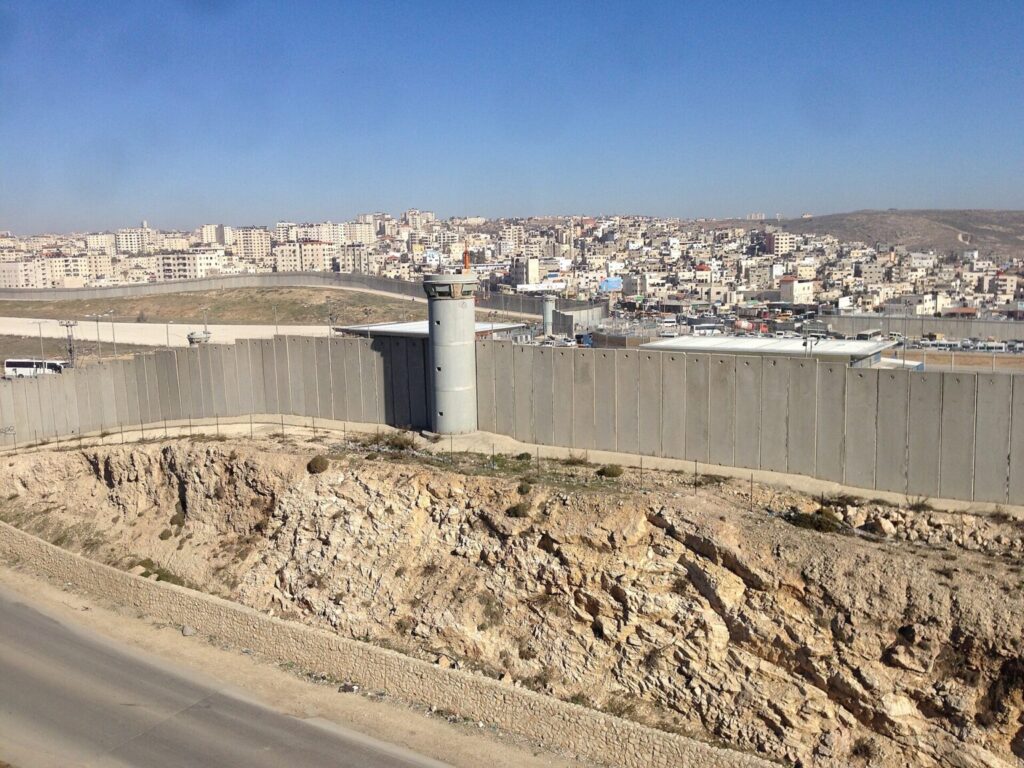
IMAGE: Watchtowers and the Israeli separation wall around the Palestinian village of Kalandia in the West Bank. (Source: L-BBE, CC BY 3.0, via Wikimedia Commons)
The constant reference to Israel’s security, without mentioning military occupation, illegal settlements (Resolution 2334), or the right of return of refugees (Resolution 194), drains this recognition of its political substance. By omitting the terms colonialism, apartheid (described as such by Amnesty International and Human Rights Watch), illegal blockade, or even genocide, Macron adopts a rhetoric of “balance” that denies power relations. He places oppressor and oppressed on the same level, erasing the colonial framework of the conflict. Finally, his insistence on the “commitments of the President of the Palestinian Authority” betrays the ambition to see the emergence of a puppet state, which will suffer the wrath of Western powers in the event of too virulent a challenge to Israeli colonialism.
Macron does not recognise Palestine as a free political subject, but as a subordinate entity, to be disarmed and normalised. This is not a step toward justice; it is a diplomatic operation aimed at colonial stabilisation, disguised as peace. In a context where every day we see images of Gazans whose deaths oscillate between famine and bombs, and of new violent incursions into the West Bank, this recognition can serve at best as temporary leverage, but it will not bring about any concrete change for the Palestinians, who will continue to suffer the horrors of colonialism. Because the ongoing massacres did not begin on October 7, 2023, they are part of a political continuity spanning more than 75 years.
See more reports from Frustration Magazine
READ MORE PALESTINE NEWS AT: 21st CENTURY WIRE PALESTINE FILES
SUPPORT OUR INDEPENDENT MEDIA PLATFORM – BECOME A MEMBER @21WIRE.TV
VISIT OUR TELEGRAM CHANNEL
Click this link for the original source of this article.
Author: Global Affairs
This content is courtesy of, and owned and copyrighted by, https://21stcenturywire.com and its author. This content is made available by use of the public RSS feed offered by the host site and is used for educational purposes only. If you are the author or represent the host site and would like this content removed now and in the future, please contact USSANews.com using the email address in the Contact page found in the website menu.

